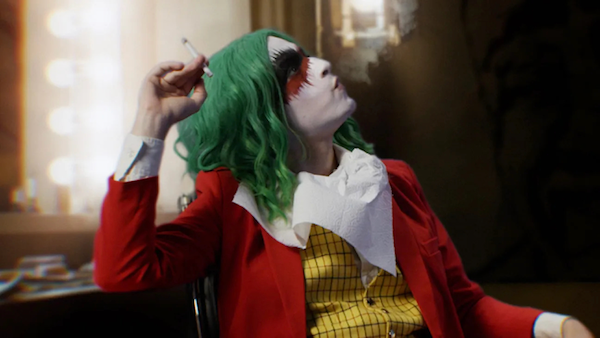Movie review by Greg Carlson
The behind-the-scenes drama swirling around Vera Drew’s feature directorial debut “The People’s Joker” has provided nearly as much excitement as the movie itself, an entertaining DIY bildungsroman built from bits and pieces of the decades-long media juggernaut driven by the mythology surrounding the most consistently popular American comic book character of the last century: Bruce Wayne’s Gotham City alter ego we know as the Batman. In Drew’s incarnation, though, the Dark Knight is no hero or main character and the faces populating the greatest rogues gallery ever assembled are no mere villains. In Joker the Harlequin, as performed and inhabited by Drew, the director imagines a worthy new addition to the Bat Family.
The catch: Drew’s efforts fall outside the sanctioned permission of DC’s corporate gatekeepers, making “The People’s Joker” a real oddity – a legally unauthorized fan film of sorts that slips through the net to attain a level of legitimacy enjoyed by precious few projects of similar pedigree. The roller-coaster details of Drew’s tenacity are still the subject of some unconfirmed speculation. Following a world premiere at the 2022 Toronto International Film Festival, subsequent screenings of “The People’s Joker” were canceled and the fate of the movie’s public availability appeared to be in doubt.
According to writer Aaron Couch in “The Hollywood Reporter,” as well as other entertainment journalists, DC parent company Warner Bros. Discovery initially exerted pressure to suspend exhibition and distribution of the movie based on copyright infringement claims. “The People’s Joker” opens with a title card identifying itself as a parody protected by fair use. As of this late July, following a limited theatrical engagement, consumers can access the movie on demand and purchase physical media including Blu-ray, DVD, and VHS thanks to queer-focused distributor Altered Innocence.
In “The People’s Joker,” Drew mixes her interest in Batman with autobiographical elements tracing the arc of the filmmaker’s personal transgender journey. Joker the Harlequin – a rather glorious combination of the masculine presentation of the Clown Prince of Crime and the femme characteristics of Dr. Harleen Quinzel – is a sympathetic protagonist that Drew imbues with pathos and vulnerability right alongside the nonstop gags and the homages and references to Batman’s vast vault. Nods to the 1966 ABC series, Burton and Schumacher-era highlights from Bob the Goon (voiced by Bob Odenkirk in one of the movie’s several celebrity cameos) to Bat-suit nipples, Prince’s musical contributions, “Batman: The Animated Series,” and many more all rocket by with dizzying frequency.
Not everything lands with the same force. Drew’s improv background and experiences in the sometimes arch circles of L.A. comedy as an editor for series including “On Cinema at the Cinema,” “Comedy Bang! Bang!” and “Who Is America?” result in some inside gags that will sail over the heads of many. But the greatest appeal to all viewers arrives courtesy of the coming-of-age story’s allure: from start to finish, Joker the Harlequin is figuring things out. A painful mother-child relationship, fraught with anxieties and the desire for love and acceptance, is just one of Drew’s fully realized storylines. Another is the difficult and unhealthy romance that develops between Joker the Harlequin and Mr. J (Kane Distler), a dangerous figure with DNA taken from Jared Leto’s “damaged” and maligned “Suicide Squad” interpretation as well as the novel configuration of Jason Todd and Carrie Kelley. Messing around in the Batman sandbox has rarely been as thrilling or as satisfying.
